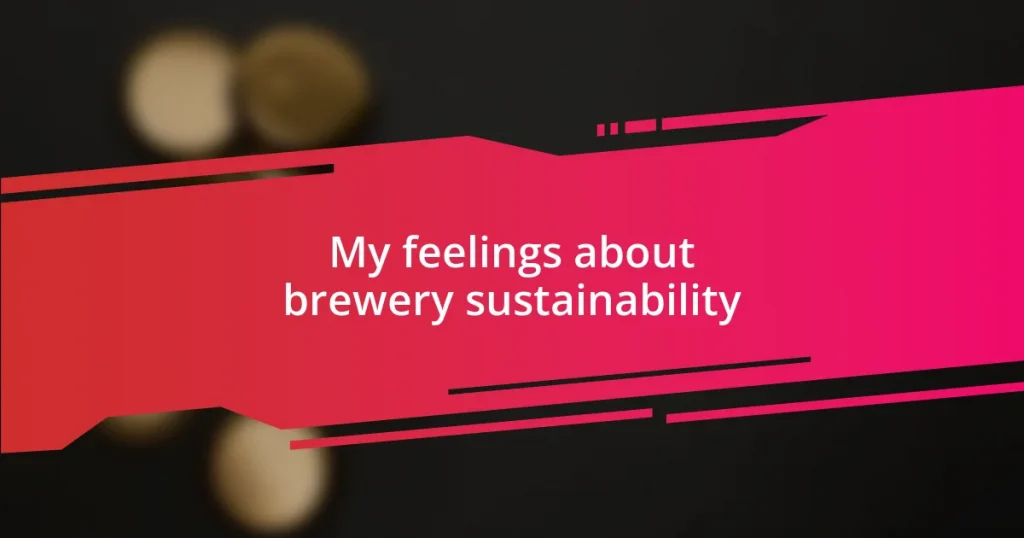Key takeaways:
- Sustainability in breweries is interconnected with environmental practices, including water conservation, waste management, and community engagement.
- Breweries adopting sustainable methods, such as sourcing local ingredients and implementing energy-efficient technologies, enhance both environmental impact and customer loyalty.
- Community involvement and educational initiatives foster a culture of sustainability, encouraging consumers to support environmentally responsible businesses.
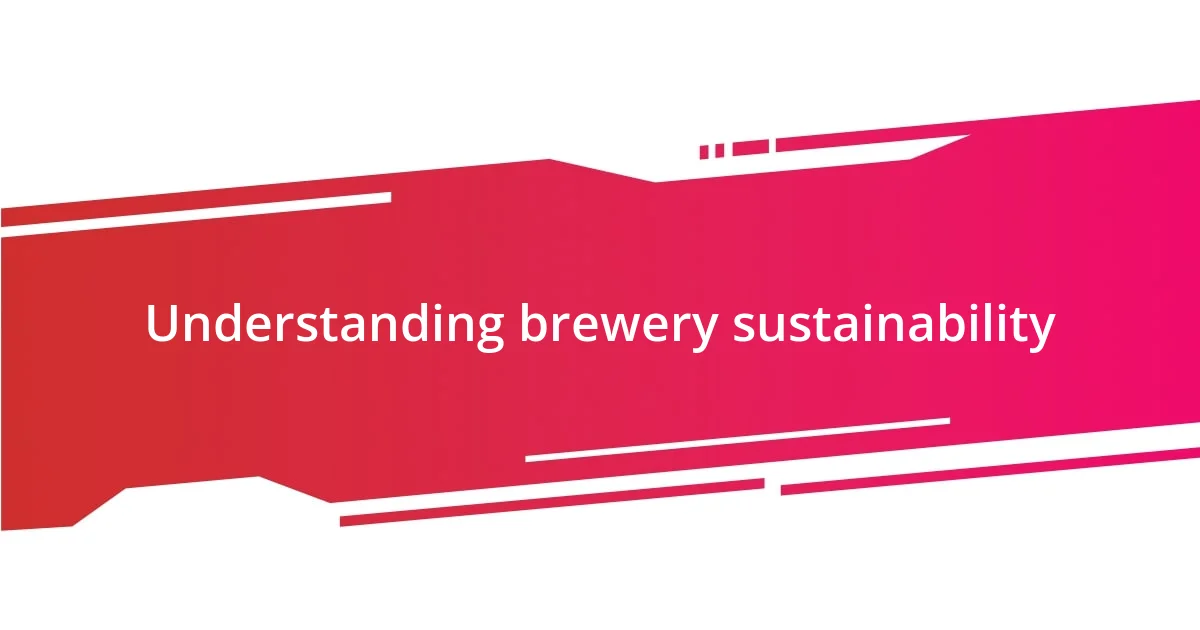
Understanding brewery sustainability
When I first started exploring brewery sustainability, I was struck by how interconnected every step of the brewing process is with the environment. For instance, did you know that a single pint of beer can require up to 20 gallons of water? That’s a staggering figure, and it really made me think about water conservation in breweries.
One memorable visit to a local brewery opened my eyes to their innovative practices. They were using spent grain to feed local livestock, which not only reduced waste but also supported local farmers. It left me wondering—how many other breweries are missing out on such mutually beneficial practices? The more I learned, the more I realized that sustainability isn’t just a trend; it’s a vital part of a brewery’s responsibility to the community and the planet.
Every time I enjoy a craft beer now, I can’t help but reflect on how that beer has made its way to my glass. The commitment to sustainability can resonate through to customers, creating a deeper connection. Isn’t it amazing to think that by choosing a sustainable brewery, we’re not only savoring a great drink but also supporting a healthier planet?
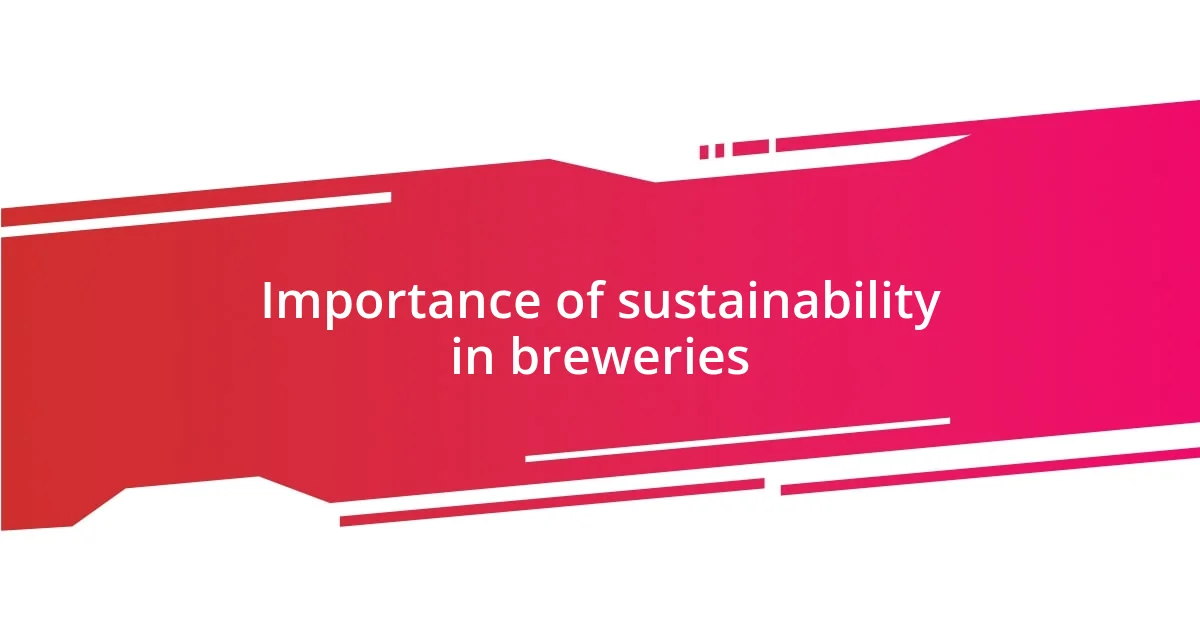
Importance of sustainability in breweries
Sustainability in breweries is not just a necessity; it’s essential for creating a lasting impact on the environment. I remember chatting with a brewmaster who proudly shared their journey toward reducing carbon emissions. They invested in energy-efficient brewing equipment and implemented a comprehensive recycling program that turned what would be waste into valuable resources. Witnessing their passion, I realized that every small choice can lead to substantial environmental benefits.
Moreover, the importance of sustainable practices goes beyond just the brewery’s operations. During a brewery tour, I saw firsthand how they collaborated with local organizations for clean water initiatives. This kind of community involvement fosters goodwill and loyalty among customers, driving home the idea that sustainability can strengthen the entire community. Isn’t it inspiring to know that by simply choosing where to buy our beer, we support businesses that prioritize our environment?
As a consumer, I often feel a sense of pride in supporting breweries dedicated to sustainable practices. The thought that my beer might come from a source that prioritizes ethical ingredients and green solutions adds depth to my experience. This symbiotic relationship between breweries and their customers accentuates the idea that sustainability is really about creating a better present and future for all of us.
| Aspect | Traditional Brewery | Sustainable Brewery |
|---|---|---|
| Water Usage | High (up to 20 gallons per pint) | Reduced through conservation efforts |
| Waste Management | Often leads to landfills | Utilizes spent grains and other by-products |
| Community Impact | Limited involvement | Actively supports local initiatives |
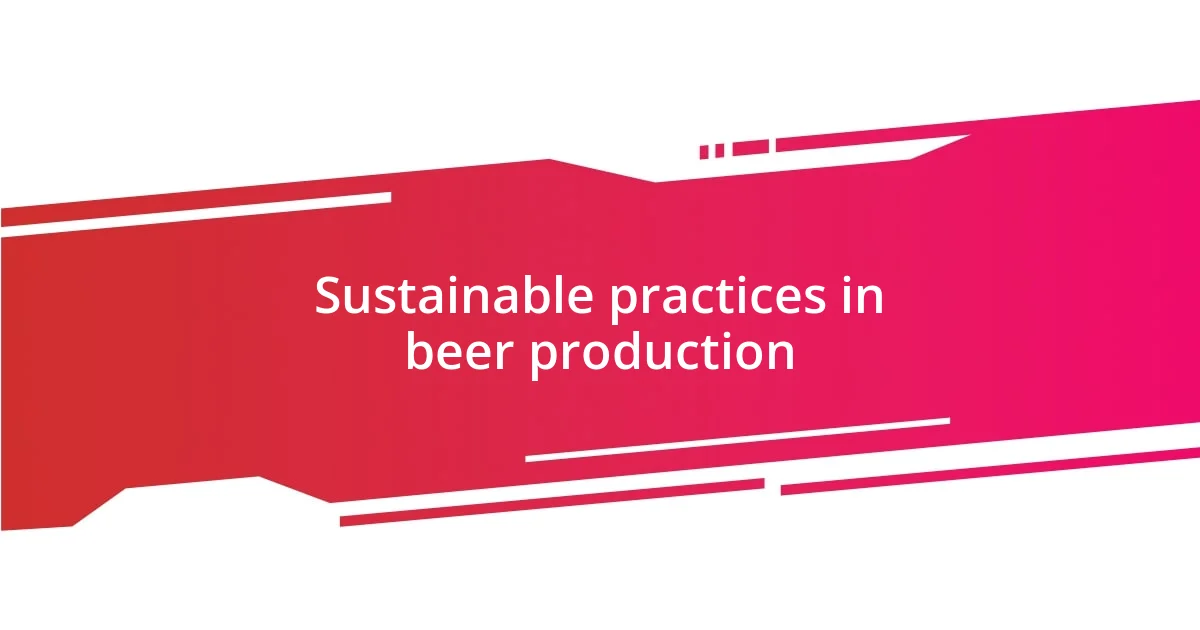
Sustainable practices in beer production
Sustainable practices in beer production are vital when it comes to creating a more eco-friendly industry. I recall visiting a brewery that harnessed solar energy for its brewing process. The brewmaster shared how this not only cut energy costs but also showcased a commitment to protecting the environment. It was inspiring to see how they embraced renewable resources as a part of their identity.
Here are some sustainable practices being implemented in breweries today:
- Water Conservation: Utilizing advanced technologies to recycle water used in brewing.
- Energy Efficiency: Investing in solar panels and energy-efficient equipment that reduce carbon footprints.
- Waste Recovery: Transforming spent grains into animal feed or compost, minimizing landfill contributions.
- Sourcing Ingredients Locally: Supporting regional farmers and thereby reducing transportation emissions.
My heart swells when I see breweries innovating for sustainability, knowing I’m part of that journey with each sip. Seeing firsthand how these efforts manifest in a brewery’s culture adds a layer of appreciation to my craft beer experience. It truly makes you wonder how each decision, no matter how small, can ripple into larger environmental impacts—a realization that makes my enjoyment of every brew feel that much more meaningful.
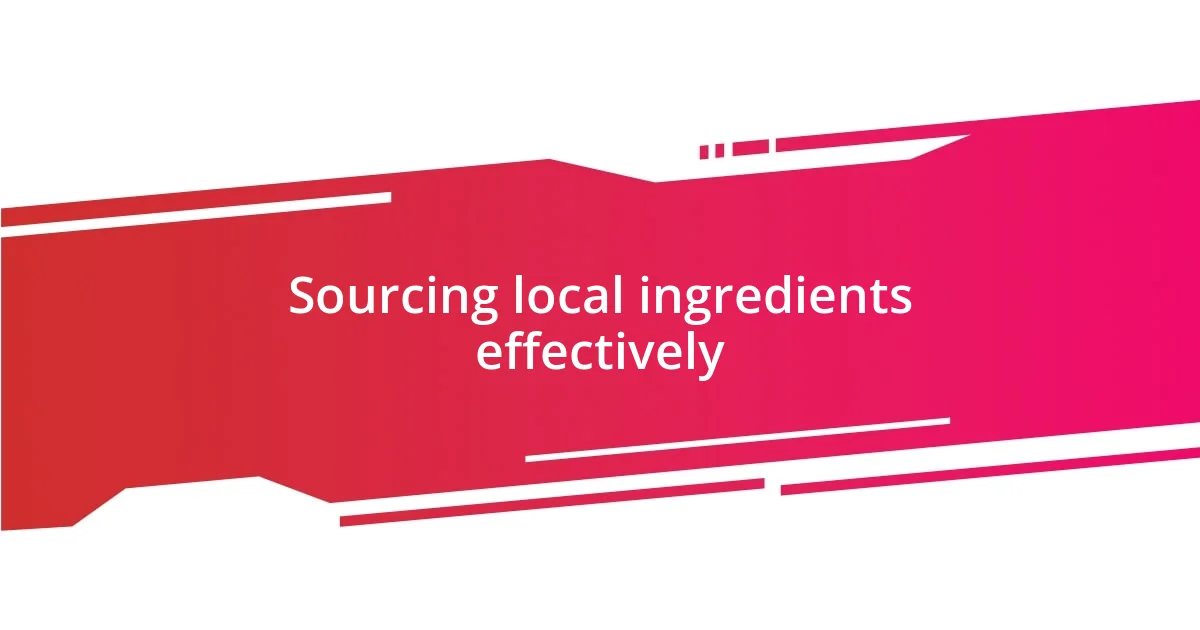
Sourcing local ingredients effectively
When it comes to effective sourcing of local ingredients, the benefits resonate deeply with both taste and sustainability. I vividly remember visiting a small craft brewery tucked away in a rural area, where the brewmaster gleefully introduced me to the local farmers who supplied their grains and hops. The pride on the farmers’ faces was tangible, and it struck me how their connection enhanced the flavor profile of the final product. Do you ever wonder how much the origin of your beer truly affects its taste?
Sourcing locally doesn’t just mean fresher ingredients; it reinforces community ties, which is something I cherish. I once attended an event where the brewery paired their latest seasonal brew with a menu created from ingredients sourced from neighboring farms. It was more than just a meal and a drink; it was a celebration of local flavors and partnerships. This experience made me feel like I was part of something bigger—supporting a local economy while enjoying an exquisite brew.
Moreover, I’ve seen firsthand how sourcing local ingredients minimizes transportation emissions, making it a natural choice for environmentally conscious breweries. When I connected with a brewery that shared its journey toward local sourcing, I felt encouraged to advocate for responsible consumption. It’s amazing to think that by simply choosing beer from local sources, we can contribute to a more sustainable world. Don’t you find it rewarding to know that your choices as a consumer can drive positive change?
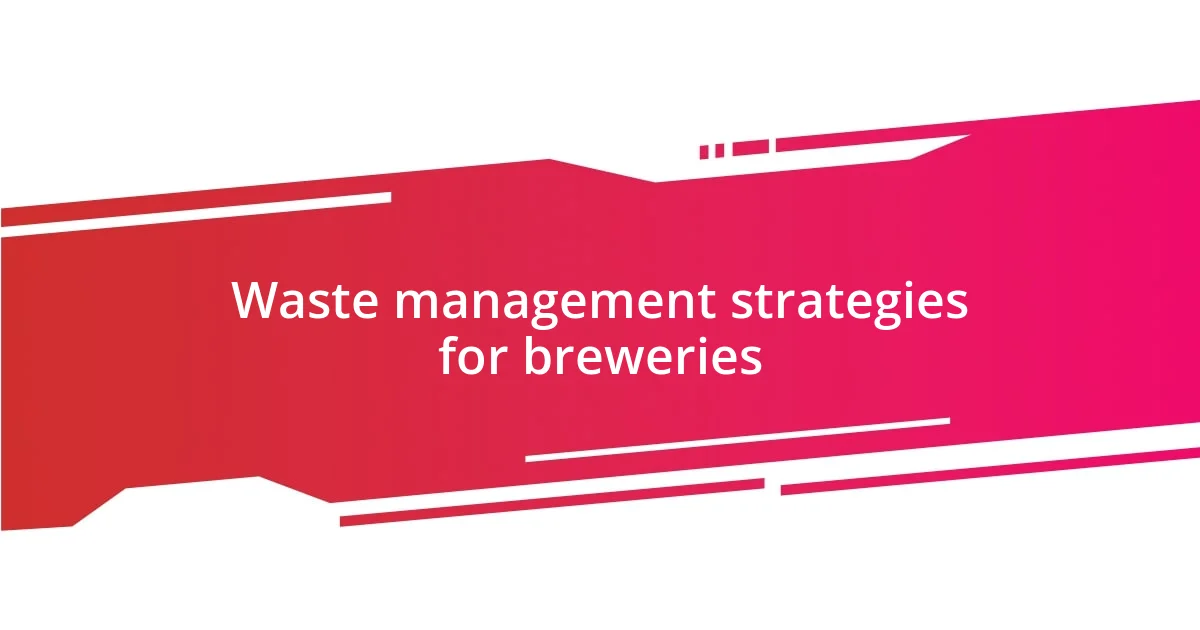
Waste management strategies for breweries
One effective waste management strategy that breweries are adopting is the recycling of spent grains. I remember chatting with a brewmaster who proudly explained how their spent grains were turned into delicious bread at a local bakery. Rather than ending up in a landfill, these grains found new life, bridging the gap between brewing and baking. Isn’t it fascinating how waste can become something enjoyable and nutritious?
Another noteworthy aspect is the implementation of anaerobic digestion, which I find particularly compelling. I visited a brewery that utilized this method to process organic waste, converting it into biogas for energy. This not only reduced their waste output significantly but also provided a renewable energy source for their operations. There’s something immensely gratifying about knowing that the scraps from production contribute to powering the very process that creates your favorite brew. Doesn’t that shift how you view waste?
Then there’s the creative reuse of materials, like packaging. I recently saw a brewery transform used barrels into charming outdoor furniture. This approach not only minimizes waste but also tells a story—it’s not just about the beer; it’s about the culture surrounding it. When I see such innovative solutions, I can’t help but feel hopeful about the brewing industry’s future, particularly as each example inspires similar initiatives elsewhere. How could we all transform our waste into something beautiful?
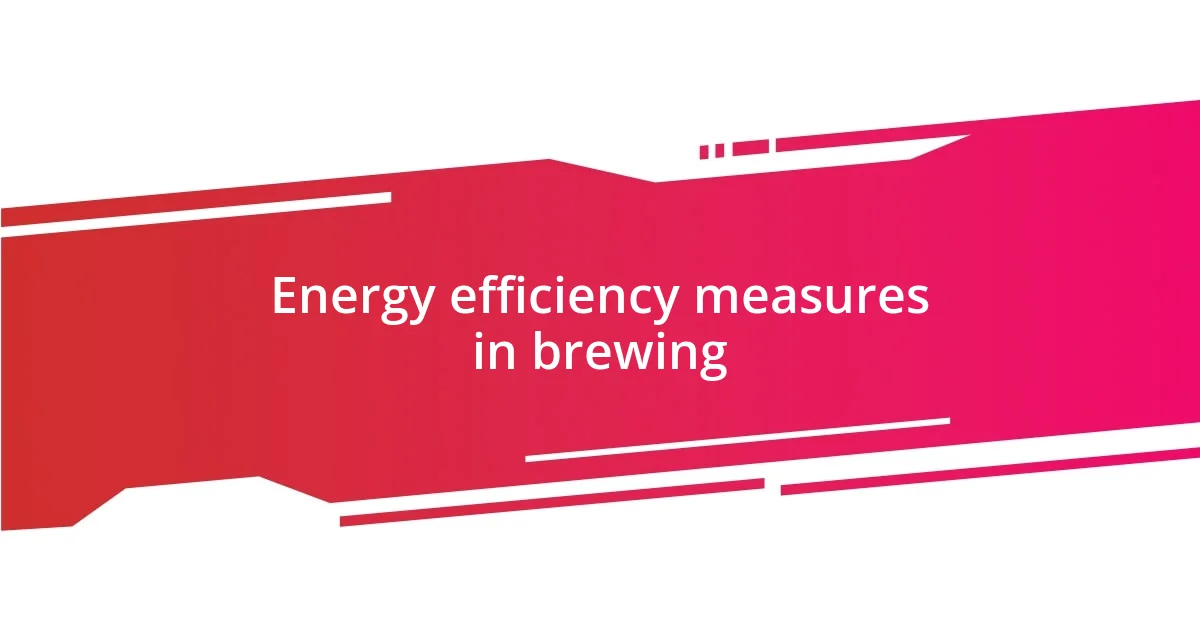
Energy efficiency measures in brewing
In my experience visiting various breweries, I’ve encountered impressive energy-saving measures that truly stand out. One brewery proudly showcased their installation of LED lighting throughout the facility, drastically reducing energy consumption while creating a vibrant atmosphere. It made me wonder—how often do we overlook the simple changes that lead to significant impacts?
Another fascinating energy efficiency measure is the use of heat recovery systems. I had the chance to see a brewery repurposing heat generated from their brewing process to warm water for cleaning and other tasks. Watching this process in action was eye-opening; it felt like a perfect example of maximizing resources in a way that not only saves energy but also showcases intelligent design. Isn’t it inspiring when breweries think outside the box to enhance efficiency?
Additionally, I was amazed to learn about solar panel installations at some breweries. One owner shared how they generated a portion of their energy right from the sun, drastically cutting their utility costs. Standing there, I could feel their enthusiasm and commitment to sustainability—their passion genuinely sparked a conversation about the broader implications of renewable energy in the brewing industry. It made me reflect: what steps can we collectively take to embrace sustainable practices in our daily lives, inspired by such initiatives?

Community engagement and sustainability
Community engagement is essential for breweries aspiring to elevate their sustainability practices. I was thrilled to attend a local brewery’s open house where they invited community members to partake in volunteer days. People from all walks of life gathered to clean up nearby parks, demonstrating that a brewery is not just a business but a community hub. There’s something heartwarming about seeing everyone come together over a shared purpose, don’t you think?
I’ve also noticed that many breweries are forming partnerships with local farmers, creating a beautiful synergy that benefits both parties. For instance, one brewery near me collaborates with a local organic farm to source fresh ingredients for their seasonal brews. When I visited the farm, the farmer expressed how this partnership not only supports local agriculture but also gives the brewery a unique edge in flavor. It’s incredible to witness how cultivating these relationships can lead to both delicious beer and a more sustainable food system. How often do we realize the intricate web of support that strengthens our communities?
Furthermore, these breweries often host educational events to discuss sustainability practices. I remember attending a workshop where attendees learned about the importance of water conservation in brewing. The excitement in the room was palpable as participants shared their own tips and tricks for reducing waste at home. It struck me how these interactions inspire a ripple effect, encouraging individuals to initiate sustainable practices in their own lives. Isn’t it remarkable how breweries serve as catalysts for broader environmental awareness?










